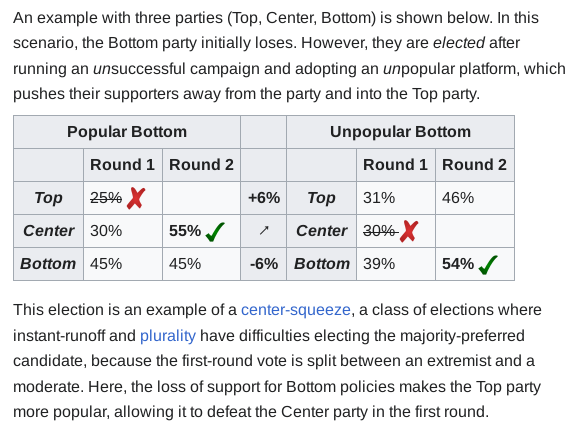No, I'm not putting this in /c/electoralism , for reasons found in the third paragraph
Most people know there's first-past-the-post and there's ranked-choice. But I've recently learned there's a much longer list than that, and they all have pros and cons.
Somecomrades would say 🙄yeah bourgeois elections who cares🙄 but that is wrong: the mathematics applies to all voting. It's the engineering side of the question: "If we have a bunch of people, maybe a hundred, maybe a million, how do we decide what the collective will is in the fairest way?" The name of the field is social choice theory because a social group is trying to make a choice.
You: oh bourgeois elections are a farce lol
Me: exactly and that's why we need to study how can voting be not a farce
First-past-the-post gets a hard time, and deservedly so. But the people who say "first-past-the-post bad, ranked choice good" are oversimplifying. It turns out there are all these mathematical trade-offs, and it is formally provable that there is no perfect system.
Most ranked choice voting systems* can suffer from a crazy effect where getting more votes makes you lose. The technical name for this is a monotonicity failure because mathematicians are shit with names. (*There are theoretical ranked-choice votings that don't fail monotonicity, but I don't know of any being applied in a political system. Companies probably have used them.)

In the 'Popular Bottom' Scenario, ![]() gets 45% of the vote and isn't elected; but in the other scenario he gets 39% and is elected. What happened is he lost supporters to a rival (Top) who eliminated his other rival (Center) for him, so he was able to sneak in.
gets 45% of the vote and isn't elected; but in the other scenario he gets 39% and is elected. What happened is he lost supporters to a rival (Top) who eliminated his other rival (Center) for him, so he was able to sneak in.
First-past-the-post doesn't have this problem: more votes is always better. But it has plenty of other problems. The USA system fails the no favorite betrayal criterion catastrophically; that's the criterion that you should be able to vote for who you like best. Usans "have to" vote for a candidate they hate.
This page summarises it pretty well: https://en.wikipedia.org/wiki/Comparison_of_voting_rules with tables comparing the different traps multi-winner systems fall into and the traps single-winner systems fall into.
Some cool systems:
-
PDF – "This paper discusses the protocol used for electing the Doge of Venice between 1268 and the end of the Republic in 1797"
Anyway, interesting stuff to think about if we design democratic/anarchistic systems for collective decision-making. It wouldn't have to be electing representatives, it could be voting on policies, same maths either way.
The fundamental problem I have with all of this kind of analysis is that it treats democracy as a tool for finding the median set of ideas amongst a population of people with ideas, and that the “most democratic” system would enact the idea of each idea set that is most tolerable to the most number of people. This is the ur-liberalism.
Politics is the process by which society’s scarce resources (commodities, nature, leisure, whatever) are allocated between people with competing interests. A just outcome would require negotiation between representatives of affinity groups, however composed and however determined, weighted somehow by the size of each group and the impact upon them. Matters of popular opinion just fundamentally are not the problem of politics, and the Condorcet criterion is only good for finding the least unpopular opinion.
I honestly think there’s just no way to make a single-seat election just or democratic in any meaningful way. Multi-member districts are better, since at least you might elect representatives from multiple affinity groups.
The fundamental problem I have with all of this kind of analysis is that it treats democracy as a tool for finding the median set of ideas amongst a population of people with ideas, and that the “most democratic” system would enact the idea of each idea set that is most tolerable to the most number of people.
Yes. Agree.
This is the ur-liberalism.
What do you mean by the word in this context?
Politics is the process by which society’s scarce resources (commodities, nature, leisure, whatever) are allocated between people with competing interests. A just outcome would require negotiation between representatives of affinity groups, however composed and however determined, weighted somehow by the size of each group and the impact upon them.
Agree.
Matters of popular opinion just fundamentally are not the problem of politics
This seems to contradict what you just said.
I honestly think there’s just no way to make a single-seat election just or democratic in any meaningful way. Multi-member districts are better, since at least you might elect representatives from multiple affinity groups.
Agree in the case of electing representatives. Sometimes by the nature of what you are voting on there can only be one winner.
e.g. if society has resources to build one hospital, and if that hospital is not some weird quantum hospital that can be in two places, then it must be in one place, so it's a single-winner choice among locations
Is the hospital location example a "process by which society’s scarce resources (commodities, nature, leisure, whatever) are allocated between people with competing interests" or is that "Matters of popular opinion" in the distinction you're making?
What do you mean by the word in this context? [ur-liberalism]
Liberalism is “the ideology of capitalism,” of course, but also all the stated beliefs about individual freedom, one man one vote, self-determinism, everything that makes westerners feel warm and squishy. I believe all of this is ultimately based in idealism; in a fundamental belief that society progresses through the competition of ideas, and that the best ideas win out when they are explained to the masses. The search for the best voting system seems like the search for the final proof that society really can be improved one good idea at a time.
Rather than, you know, reckoning that the history of politics is the history of class struggle.
Hospital example
So starting with the assumption that people who want to build a hospital negotiated for the resources to be diverted to build exactly one hospital (in today’s world: they got a grant from the feds):
Voting obviously isn’t where we start; if each individual has a different idea of where to build the hospital there’s nothing to vote on.
Influential individuals might put forth ideas or arguments as to where to put the hospital, and they might collect others around them and organize for their preferred location. Maybe opinion coalesces around two locations, A and B. We now have two affinity groups, who have decided they have a collective interest in each of those locations, with people making any number of individual negotiations to land themselves in those groups.
The politics happened when people organized themselves into groups and decided on their interests. Ideally, the final decision would involve a negotiation between these groups (hospital goes to A, but with a tram line to the largest neighborhood near B, or whatever).
This isn’t really very different than how it works now, except now the groups wouldn’t usually have any public involvement since most people intuitively understand that they have no political relevance. Some capitalist who wants A will direct their lobby group to ask that of officeholders, maybe capitalist B also exists, maybe others if they don’t get scared off by the competition. The officeholders don’t generally have any personal interest in the outcome—they aren’t members of either group in our example—but they have interests in keeping various lobby groups happy and might negotiate with them on those terms. The point is that the political negotiations always happen.
The final voting on A or B, if it happens, is just a formality. Even if we had direct democracy the process to get to those two was much more impactful, and only the really interested would come out to vote anyway, making it again mostly a formality. If you could force every person to have an informed opinion on A or B, and then force them all to vote, then certainly the result would be meaningful… but this comes back to exactly my point about idealism.
Ultimately my point here is that matters of public political opinion only exist in the kind of mathematical models used to evaluate different voting systems. All real politics is negotiation, and finding the best voting system is irrelevant.
I do think these weird elaborate examples of a city choosing where to build a hospital (or see above for the Mars colony thing) are a huuuuge red herring. Determining where to build a hospital and all other essential public infrastructure is not a question of democratic political will. The political will demands to make the hospital high quality, free at the point of access, etc. But optimization of those systems are best carried out by city planners coordinating with public transport access etc in collaboration with and overseen by citizen councils. Perhaps on a rare occasion, there really are two equally good choices, but I find that to be very unlikely most of the time with regards to these kinds of hypotheticals.
TLDR: Planning is good and can and will solve a lot of these problems. Democratic will is best imposed as oversight over a scientific planning process and through the setting of social goals. Direct policy votes probably will be appropriate in some circumstances, but I think what exactly will be learned during socialist construction.
I do think these weird elaborate examples of a city choosing where to build a hospital
What do you mean when you say siting a hospital is "weird eleaborate"? I picked it because it's the most down-to-earth example I could think of, it affects people's lives and deaths and is an issue I have spent hundreds of hours campaigning on.
Determining where to build a hospital and all other essential public infrastructure is not a question of democratic political will.
I agree it "is not a question of democratic political will" in non-democratic societies like the USA or China. But in a society ruled by the people, then the people decide.
There's no ideological workaround for to the fact that society has to make choices. First, we need hospitals. Second, the hospitals need to be located somewhere. Third, the choice has to be made, the hospital won't be sited without some chooser. Fourth, in a people-ruled system, we need some way of converting diffuse individual wishes into a decision.
Planning is good and can and will solve a lot of these problems. Democratic will is best imposed as oversight over a scientific planning process and through the setting of social goals.
Towards a New Socialism talks about the intersection of planning and democratic choice. They say planning can produce multiple feasible plans and then the people choose among them.
TANS is exactly what I was thinking of. I'll take another look at what he recommends direct democracy for.
And regarding the hospital example... I think in many well-planned cities there is probably going to be an ideal location near the primary public transportation hub to put something as important as that. If there are two large but disparate population centers in one city, then hopefully the democratic will says build two hospitals, not one shitty one in the middle away from both population centers or simply the one in either center that gets the most votes. Of course I agree choices will need to be made, I'm just interested in balancing these choices with optimal planning. So, if something is better than RCV that's great, but I remain unconvinced that RCV isn't already a good enough improvement to immediately jump all FPTP systems to in the interim.
I agree that figuring out ideal voting systems is an exciting endeavor, and different systems can be more or less appropriate. However, I completely fail to see how the Wikipedia examples represent a "failure" of ranked choice voting.
Most ranked choice voting systems can suffer from a crazy effect where getting more votes makes you lose
For the first election: you're making it sound like Bottom receiving the plurality of votes (45%) in the first round is causing it to ultimately lose. This is not true, Bottom loses because the majority of voters (55%) prefer Center to Bottom which is made clear in the second round after elimination and transfer of preferences from Top. This is good, this is the point of RCV and why it is vastly superior to FPTP.
Now for the second election: claiming that Bottom is all the sudden unpopular and therefore them winning is a bad thing is doing a lot of heavy lifting here to try to make ranked choice voting look bad. Why did all 6% lost from Bottom go into Top but then Center is split exactly down the middle in terms of preference? Those circumstances seem artificially contrived to me and not very reflective of how overlapping ideologies between parties would actually interact, especially as in the previous election the entirety of Top goes to Center as their 2nd preference (not calling you out but the sus wikipedia example). Again, the result is that
The reason I'm going kind of hard here, and I might be going a little crazy, is because I really feel like all this sudden RCV hate is very suspicious. I've had several otherwise "woke" and more-progressive-than-not friends sharing TedX videos giving similarly contrived situations to show that RCV is actually really bad and can totally be just as undemocratic as FPTP (their example was literally about where to put a refueling base for 4 weirdly spaced out Mars colonies). Then there was the recent Veritasium video about how voting is imperfect and can never be solved!!1! (So why bother, right guys?) And yeah, I get this weird feeling that even this incredibly simple reform that could bring a trifling of more authentic democratic representation to our Bourgeois Dictatorship of Capital that we call American Democracy is somehow getting psyoped against in order to maintain the two-party dictatorship. Like, all the big pop science entrenched youtube channels creating these kinds of videos just seems like a PR campaign to specifically dissuade those bazinga types that at least should be able to understand on a logical/mathematical level that RCV is much better.
Anyways, my main take is RCV is good and quite literally always better than FPTP. It's the simplest reform that should be default on any liberal party's platform if they weren't deeply unserious. Whether we end up even having direct elections of representatives or multi-option direct ballot initiatives in socialism I don't feel as strongly about, I'm open to all kinds of ideas. But don't let the RCV hate spread uncritically. If I'm totally off base than someone explain below cause I do feel like I'm going a little crazy here.
Those circumstances seem artificially contrived
Yeah, because you have to come up these weird little tortured examples to make the system that determines outcomes based on the couple percent of the population that live in particular states seem okay
it used to study social choice theory a lot and so it was in the position you're in now. In the end, it turns out most of the math is completely irrelevant because people don't act according to rational incentives, but what they believe they're incentivized to do. In most systems, people exhibit behaviors that lead to two-party systems and all the other problems with FPTP. That includes all the "good" systems like Condorcet, Borda, etc. with the exception of range voting, where people actively vote more for unpopular options thereby giving "fringe" options a chance.
Anyway, it isn't really true that it matters to all voting. If you're forming a consensus, that counts as voting since you're documenting your preferences or your motivational profile, for instance.
I'd be pretty wary about relying on all the tortured math examples that "prove" STV and similar ranked choice systems are bad
I agree. Empirical studies are needed, not just examples.
Graham-Squire, Adam T.; McCune, David (2023-06-12). "An Examination of Ranked-Choice Voting in the United States, 2004–2022". Representation: 1–19. arXiv:2301.12075. doi:10.1080/00344893.2023.2221689. looked at 185 elections and found monotonicity failures in 5 of them, 2.7%
With sufficiently large representative body sortition is best, the rest is bourgeois decadence. Obv won’t work with sample of like 3 in some bigass city
I don't know if you're in a political party or not, but say you are.
And say there's a proposal that the party could choose to adopt or reject. Will we issue a statement of support for Palestine?
Would you be want a coin to be flipped to make that decision?
Sortition deals away by having no parties. Average 7/10 brit will say piss on israel, thus majority of randomly selected people would as well.
You talking about collective decision making or party, exactly? Gun to my head, sortition is impossible, people vote on blind programs enumerated, and don’t know which party is which, no debates nothing.
Main reason of no direct democracy, people will check out of decision making if you have to deal with small annoying bullshit each day.
Inside party I would assume I join like minded people, and palestine is fairly old check for leftists. Inside party I would assume democratic centralism (which is how parties work anyway, despite scary name), people who don’t like resolution quit.
If you talk inside states as how they are now, executives heads (like transport, environment whatevs) are elected with programs, not anointed by a single dipshit and their party
Inside party I would assume democratic centralism (which is how parties work anyway, despite scary name), people who don’t like resolution quit.
Your meeting hall would be empty after ten resolutions
How are spd still functioning then? Or dems? They may grumble, they still do their shit. People “don’t like it, but will do it” happens way more often than “fuck y’all with this shit” . Inside (ideological) parties they have core program, not whatever neolibs are doing, like party goals. Commies believe in abolishing ownership, fashies believe in rounding up minorities, dems believe in private-public ownership and minority rights signaling. You agree with core program and deal with bullshit
famously empty party: the Communist Party of China
The maths you're talking about rank fairness by how many (percentage) of the voters end up with a satisfactory outcome. There's a saying that the only perfectly fair voting system is a dictatorship, because only one person gets to vote, and they always get what they want. All other systems have flaws. As in most things, you are trying to maximize fairness.
The secondmost fair system is the Condorcet method, and in fact other systems are usually ranked by how often the winner is the Condorcet winner. The reason nobody uses Condorcet itself is that it's extremely complicated, and one tradeoff in any election system is whether the voters are able to understand, and therefore trust, the system. The more simple the system, the easier to explain, and the more people trust the outcome. FPTP's singular virtue is that it's stupid simple, and any idiot can understand it. Condorcet is at the other extreme, and other systems fall in between.
Ranked Choice is reasonably simple, and produces more Condorcet winners than FPTP. STAR is a little more complicated, but also a little more fair. And, yes, every system has edge cases where the wrong person - someone other than the Condorcet winner - is elected.
The objective is to get there best outcome for the most people, which includes strategies like reducing motivations for strategic voting, and allowing for compromise. The benefit to nearly every system other than FPTP is that they allow for the election of maybe nobody's favorite, but someone that it's acceptable to 100% of the voters; this is considered "more fair" than 51% getting their favorite, and 49% get someone they actively object to.
As you've found, no system is perfect (except dictatorship), and you can always concoct edge cases where the method fails; but that doesn't mean that some aren't better or worse than others, fairness-wise.
One absolute truth, though, is that FPTP is the provably worst system in terms of producing fair outcomes. In the US, Ranked Choice is slowly replacing FPTP in local elections. It's not the best, but it's better, and it's understandable, could be verified by hand, and doesn't require a computer to produce results within a reasonable time. In this case, Perfect is the enemy of Good, and while we could debate endlessly on the merits of various systems, replacing FPTP with Ranked Choice is a definite improvement.
It's very demonstrably not even the case in most cases we deal with that everyone getting something acceptable is more fair than some getting their favorite. Maybe in a hyper-egalitarian situation that is the case, but in most cases there are some who have more at stake and are more vulnerable. It's important to remember what it means for a situation to be fair, a situation that we would impartially approve of (say, by not knowing who we are in a situation and acting in our self-interest). In such a situation, you'd want those with the most at stake to get their way, even if they're the 49% and the rest aren't happy with it. If we don't accept that then it's really unclear why we anarchists give a shit about consensus.
In this case, everyone may find a particular choice acceptable, but find the overall decision-making situation unacceptable. Like, if you're disabled, and you rarely get to eat foods that you enjoy, and your friends invite you out, you may find certain restaurants acceptable because they at least have fries or a salad you can eat without throwing up but you'd love to go to one of two restaurants. Your friends eat out every other week and can eat pretty much anything, minestrone, rotini, a whole plant-based ice cream cake each, whatever. You may find those acceptable restaurants acceptable, but find it unacceptable that your needs and desires don't outweigh the others for this decision-making.
It's not fair. It's obviously not fair, even though everyone is getting the acceptable option. In this case, going where you want, even if the others would prefer not to go to those restaurants, is fair. And most group decision-making situations today are like this.
Liberal ideology, universal suffrage is a terrible way to run a real country. Council systems are superior in every way. Democracies based on population count specifically targets and dis-empowers minorities. It also doesn't properly take into account specific needs of specific groups. direct democracy is primitive and unsuited to delegating authority and politics in countries with millions of people with vastly different ideas and interests between them.
You cannot please everyone, there is no utopia, you're always going to be stepping on someones toes just a bit when making decisions, especially big ones. Decentralization does not always equal democracy.
This isn't about universal suffrage or 'representative' 'democracy', though, and these voting mechanisms are also relevant in council systems.
Liberal ideology, universal suffrage is a terrible way to run a real country. Council systems are superior in every way.
What do you mean by "council systems"? Do you mean picking people at random (choice by sortilege) and having them vote on issues?
There's no way around the fact that you have to make a social choice.
You cannot please everyone, there is no utopia, you're always going to be stepping on someones toes just a bit when making decisions, especially big ones.
That's what makes it an interesting thing to study. How can we get as many people's opinions together and approximate some sort of "will of the people"? There's no such true, objective thing, no "will of the people", but we have to rough one out in order to build trains, distribute resources. We can't simply wash our hads of the problem.
Rating-based voting doesn't seem to have the issue of non-monotonicity that ranked voting does.
Electoralism is dumb
Social choice theory is the intersection of game theory (bullshit) and economics (also bullshit) so it's double bullshit
Just let people vibe
Isn't game theory the math thing they used to make a computer beat a human at chess? I know that it's more than that, but this is a pretty broad thing to call bullshit.







